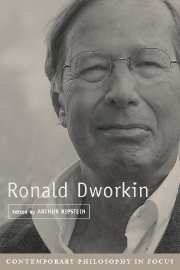Book contents
- Frontmatter
- Contents
- Contributors
- Introduction: Anti-Archimedeanism
- 1 The “Hart–Dworkin” Debate: A Short Guide for the Perplexed
- 2 The Rule of Law as the Rule of Liberal Principle
- 3 Liberty and Equality
- 4 Rights, Responsibilities, and Reflections on the Sanctity of Life
- 5 Hercules, Abraham Lincoln, the United States Constitution, and the Problem of Slavery
- Bibliography
- Index
Introduction: Anti-Archimedeanism
Published online by Cambridge University Press: 05 June 2012
- Frontmatter
- Contents
- Contributors
- Introduction: Anti-Archimedeanism
- 1 The “Hart–Dworkin” Debate: A Short Guide for the Perplexed
- 2 The Rule of Law as the Rule of Liberal Principle
- 3 Liberty and Equality
- 4 Rights, Responsibilities, and Reflections on the Sanctity of Life
- 5 Hercules, Abraham Lincoln, the United States Constitution, and the Problem of Slavery
- Bibliography
- Index
Summary
I said I thought that legal philosophy should be interesting. He jumped on me. “Don't you see?” he replied. “That's your trouble.” I am guilty of his charge.
– Ronald DworkinRonald Dworkin occupies a distinctive place in both public life and philosophy. In public life, he is a regular contributor to The New York Review of Books and other widely read journals. In philosophy he has written important and influential works on many of the most prominent issues in legal and political philosophy. In both cases, his interventions have in part shaped the debates he joined. His opposition to Robert Bork's nomination for the United States Supreme Court gave new centrality to debates about the public role of judges and the role of original intent in constitutional interpretation. His writings in legal philosophy have reoriented the modern debate about legal positivism and natural law. In political philosophy he has shaped the ways in which people debate the nature of equality; he has spawned a substantial literature about the relation between luck and responsibility in distributive justice; he has reframed debates about the sanctity of life. His work has been the focus of many recent discussions of both democracy and the rule of law.
Dworkin's public and philosophical voices are closely connected. He criticizes Robert Bork for his deficient views about the relation between law and morality, the proper conception of democracy, and the philosophy of language.
- Type
- Chapter
- Information
- Ronald Dworkin , pp. 1 - 21Publisher: Cambridge University PressPrint publication year: 2007
- 2
- Cited by



